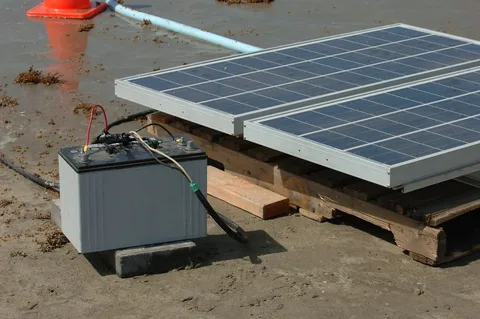The Importance of Batteries for PV Panels Explained

In today’s world, where sustainability and renewable energy sources are becoming increasingly important, the use of solar panels to harness solar power is on the rise. One key component that is often overlooked but plays a crucial role in maximising the benefits of solar panels is batteries for PV-panels. These batteries are essential for storing excess energy generated by solar panels during the day for use at night or on cloudy days. In this blog post, we will delve into the importance of batteries for PV panels and why they are essential for enhancing energy independence, improving the reliability of solar power systems, maximising financial benefits, contributing to a greener planet, navigating the future of solar energy storage, understanding different types of solar-battery packages, exploring the long-term cost savings, and much more.
Enhancing Energy Independence with Batteries
The integration of batteries with PV-panels is pivotal in boosting energy self-sufficiency for both residential and commercial entities. These storage units capture surplus electricity produced during peak sunlight hours, allowing for its utilisation during periods of low sunlight or at night. This capability significantly diminishes reliance on the conventional power grid, providing a steadfast energy reserve in instances of power interruptions or during peak tariff times. The autonomy afforded by this setup encourages a more resilient approach to energy consumption, enabling households and businesses to manage their energy needs with greater control and predictability.
Such independence is not only economically advantageous but also aligns with the broader objective of fostering sustainable energy practices. By decentralising energy sources, batteries for PV-panels contribute to a more robust and self-reliant energy landscape, empowering users to navigate the challenges of energy supply with confidence and efficiency.
Improving the Reliability of Solar Power Systems
Solar power systems, whilst efficient, are subject to variability due to changing weather conditions and the cyclical nature of day and night. Batteries for PV-panels significantly enhance these systems’ dependability by mitigating these fluctuations. They achieve this by capturing surplus energy when the sun’s rays are most potent and storing it for periods when solar input is reduced or non-existent.
This stored energy can be deployed to maintain a steady electricity supply, ensuring that power outages or dips in production do not disrupt the end user’s consumption. Moreover, the presence of batteries facilitates a smoother energy supply, moderating the output to match the demand effectively. This capacity to buffer and balance makes solar energy a more reliable and stable power source, encouraging wider adoption and reliance on renewable energy solutions.
Maximising the Financial Benefits of Solar Battery Pack
Investing in a solar battery pack is not merely about enhancing energy independence or contributing to a greener planet; it’s a financially savvy move for both households and businesses. The strategic storage and utilisation of surplus solar energy can significantly reduce electricity costs, especially during peak demand periods when electricity rates are at their highest.
This smart energy management enables users to circumvent high tariffs, leveraging stored energy instead of drawing from the grid. In addition, many governments recognise the value of solar energy storage and offer financial incentives, such as rebates or tax deductions, to encourage the adoption of solar battery systems. These incentives not only make the initial setup more affordable but also amplify the long-term economic gains.
The essence of solar battery systems lies in their ability to store energy efficiently, thus providing a buffer against the volatility of energy prices. This energy arbitrage, buying low (or generating your own energy) and using it when prices are high, represents a clear financial advantage. It’s important to note, however, that the degree of savings will depend on several factors including the size of the battery system, the energy consumption patterns of the household or business, and the specifics of local energy tariffs and incentives. Despite the upfront costs associated with solar battery systems, the potential for substantial savings over time is a compelling reason for their consideration.
Contributing to a Greener Planet
Incorporating batteries into PV-panel systems significantly enhances the environmental benefits of solar energy. By enabling the storage of surplus renewable energy, batteries ensure that the clean power generated does not go to waste. This capability facilitates a greater displacement of conventional electricity, which is often derived from burning fossil fuels, thus contributing directly to a reduction in greenhouse gas emissions.
Utilising stored solar energy, especially during peak demand times, further lessens the strain on the grid, reducing the need for additional fossil fuel-based power generation. Importantly, as battery technology advances, the efficiency and capacity for energy storage improve, promising an even greater potential for solar power to contribute to a sustainable energy mix.
The adoption of batteries for PV-panels is not just a step towards energy independence; it is a stride towards achieving a low-carbon future. Their use underscores the commitment to harnessing renewable resources in a manner that respects our planet’s ecological balance, supporting efforts to combat climate change and preserve the environment for future generations.
Navigating the Future of Solar Energy Storage
As we venture deeper into the era of renewable energy, the trajectory of solar energy storage becomes increasingly intertwined with advancements in battery technology. The role of batteries in PV-panel systems is becoming more pivotal, not just for individual users seeking energy autonomy, but also for the broader integration of solar energy into national grids. The evolution of battery technology, promising higher capacities, faster charging times, and longer lifespans, is set to revolutionise how we store and utilise solar power.
Innovations such as solid-state batteries and enhancements in lithium-ion technology are paving the way for more efficient, durable, and environmentally friendly storage solutions. These advancements are crucial for addressing the intermittency challenges of solar power and making it a more reliable energy source. Moreover, the development of smarter energy management systems, capable of optimising battery usage in real-time, will further enhance the efficiency of solar storage.
As policies and market dynamics evolve, the adoption of solar batteries is expected to surge, driven by the declining costs of battery systems and the growing awareness of the benefits of energy storage. This paradigm shift towards more sustainable and resilient energy systems underscores the importance of continued innovation and investment in battery technology. The future of solar energy storage not only promises to elevate the viability of solar power but also plays a critical role in the global transition towards a more sustainable and renewable energy landscape.
Understanding the Different Types of Solar Battery Package
Choosing the right type of solar battery package is pivotal to achieving optimal performance and efficiency.
Lead-Acid Battery
Amongst the array of options, lead-acid batteries, whilst being the most economically accessible, offer a lower cycle life and require more maintenance.
Lithium-Ion Battery
On the other hand, lithium-ion batteries stand out for their higher energy density and longer lifespan, albeit at a higher initial cost. They also boast a smaller footprint and faster charging times, making them a popular choice for residential and commercial solar systems.
Flow battery
Additionally, flow batteries, though less common, offer unique benefits for large-scale energy storage, such as longer discharge times and the ability to maintain full capacity over many cycles. Each type presents distinct advantages, factoring in aspects like storage capacity, longevity, and budget constraints. It’s essential to assess these considerations meticulously to align with your specific energy needs and objectives, ensuring your investment in a solar-battery package delivers the desired outcomes in sustainability, reliability, and cost-efficiency.
The Role of Batteries in Grid-Tied and Off-Grid Systems
Batteries in PV-panel setups serve distinct, yet equally crucial roles depending on whether the system is grid-tied or entirely off-grid. In grid-tied configurations, the primary advantage of integrating batteries is the ability to store surplus solar energy generated during peak sunlight hours. This not only provides a backup during power cuts but also enables households to utilise their stored energy during peak pricing periods, reducing dependency on the grid and leading to cost savings.
Conversely, in off-grid systems, batteries are indispensable, offering the sole source of power when sunlight is unavailable. They ensure a consistent energy supply, crucial for remote locations where grid access is non-existent. In such setups, the capacity and reliability of the battery system directly impact the overall efficacy and convenience of the solar power system, making the choice of battery technology and capacity a critical decision for those seeking autonomy from the grid.
Exploring the Long-Term Cost Savings of Solar Batteries
The prospect of integrating batteries into PV-panel systems, albeit accompanied by an initial financial outlay, promises considerable economic advantages over the lifespan of the installation. The dynamics of solar energy storage fundamentally transform how households and businesses interact with the energy market. By capitalising on the stored energy during peak tariff periods, users can significantly diminish their reliance on expensive grid electricity. This approach not only offers an immediate reduction in energy costs but also shields consumers from the volatility of energy prices.
Moreover, the potential for long-term cost savings extends beyond mere energy bill reduction. Enhanced energy autonomy means less wear on the grid infrastructure, potentially deferring costly grid upgrades that are often passed down to consumers. The longevity and efficiency of solar batteries have seen progressive improvement, increasing the return on investment over time.
Government incentives, where available, further tip the scales in favour of solar batteries by offsetting part of the upfront cost, thus shortening the payback period. As energy prices continue to rise globally, the savings accrued from using solar batteries become even more pronounced. This financial calculus, while dependent on factors such as energy consumption patterns and local tariff structures, underscores the economic rationale for adopting solar battery systems.
In essence, the decision to invest in batteries for PV-panels is not just a commitment to renewable energy but a strategic financial decision that yields dividends in the form of long-term cost savings.
Conclusion
The pivotal role of batteries for PV panels cannot be overstated. They bridge the gap between the potential and practical usability of solar power, ensuring that the renewable energy captured during the day can be effectively utilised when the sun isn’t shining. This dynamic duo of solar panels and batteries heralds a new era of energy independence, reliability, and financial prudence. Moreover, their contribution towards a more sustainable and greener planet aligns with global efforts to combat climate change.
| Related Business Listings |
| Contact Directory |
| Local Business Profiles |
FAQs
Q: Are batteries an essential component for all solar panel installations?
A: Batteries are not mandatory for all solar panel systems but are crucial for those looking to store excess energy for use when direct sunlight is not available. They significantly enhance the system’s efficiency and autonomy.
Q: What is the typical lifespan of solar battery pack?
A: The longevity of solar battery pack varies by type; for instance, lithium-ion batteries may offer a longer operational life compared to lead-acid ones. Generally, you can expect a solar battery to last between 5 to 15 years, depending on the technology and how it’s used.
Q: Do solar batteries demand regular maintenance?
A: Maintenance requirements differ based on the battery type. Lead-acid batteries typically need more frequent upkeep, such as checking water levels, whereas lithium-ion batteries are largely maintenance-free but benefit from periodic checks to ensure they are operating correctly.



